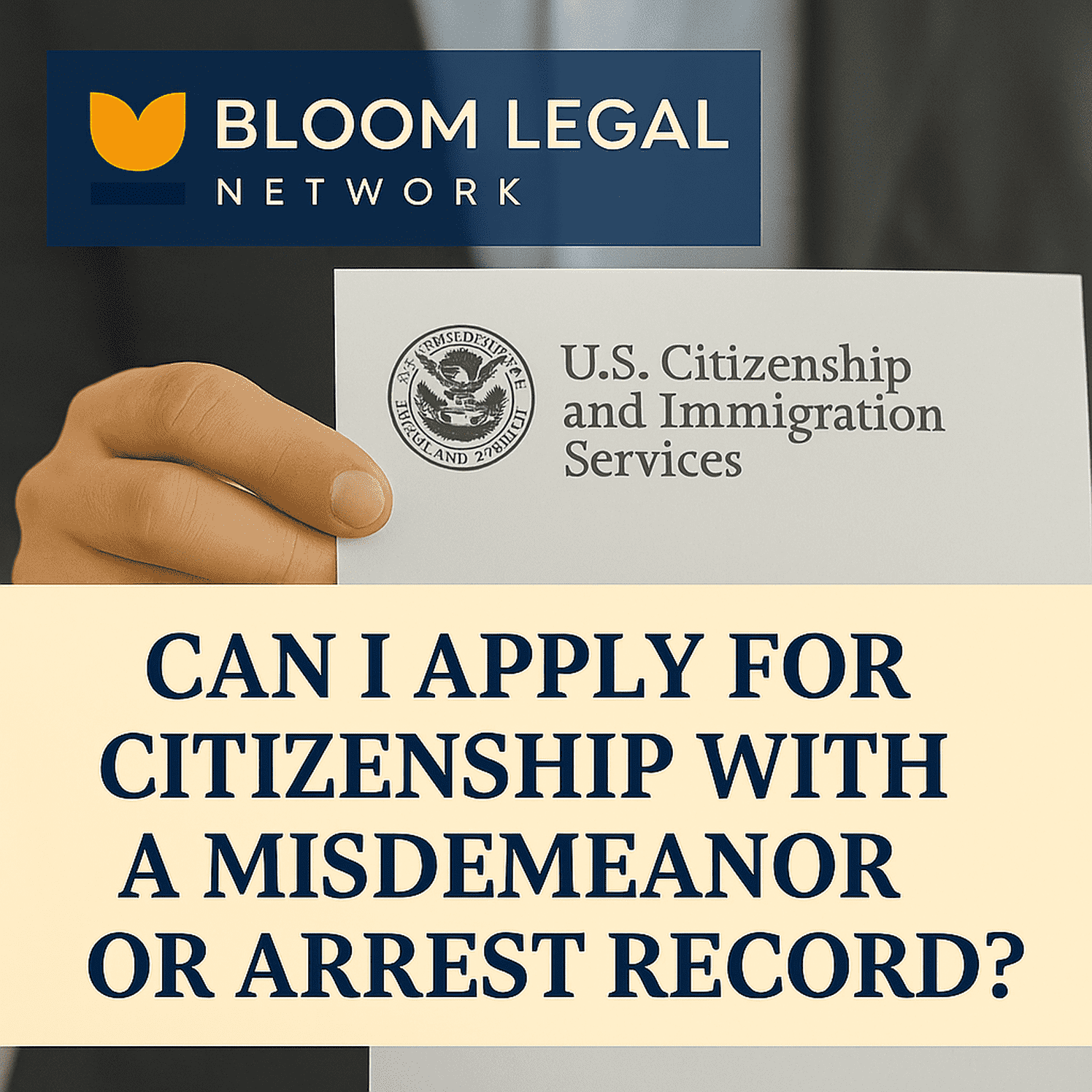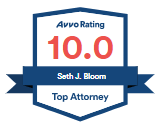Can I Apply for Citizenship with a Misdemeanor or Arrest Record?

Will a misdemeanor affect my chances of becoming a U.S. citizen?
Applying for U.S. citizenship is one of the biggest milestones in an immigrant’s life—a process that demands precision, commitment, and transparency. But for many immigrants in Louisiana, from the vibrant communities of New Orleans to the suburbs of Metairie and Jefferson Parish, a past misdemeanor, an arrest, or even an old conviction casts a shadow of doubt over their application.
The critical question is: Will my criminal record prevent me from naturalizing?
The good news is that a criminal record does not always mean your application will be denied. However, it absolutely makes your case more complicated. Understanding how U.S. Citizenship and Immigration Services (USCIS) reviews criminal histories and how to prepare your case properly is the difference between approval and the heartbreaking rejection of your Form N-400 application.
At Bloom Legal Network, we connect individuals throughout Southeast Louisiana with our experienced immigration attorneys who specialize in complex naturalization cases. We evaluate your record, explain your legal options, and help you move forward toward U.S. citizenship with clarity and confidence.
The Non-Negotiable Standard: “Good Moral Character” (GMC)
When you apply for naturalization, USCIS reviews your entire immigration and criminal history, often checking records that span decades. This includes every arrest, conviction, expunged record, and even charges that were later dismissed.
The legal yardstick for every applicant is “good moral character” (GMC)—a key, non-negotiable legal standard in the naturalization process.
The Five-Year Lookback Period
Generally, USCIS officers focus on your behavior over the five years immediately preceding your N-400 filing (or three years if you are applying based on marriage to a U.S. citizen). This is the statutory period for GMC.
However, it is a dangerous misconception that offenses outside this five-year window are ignored. Serious offenses, or a pattern of persistent minor misconduct outside that period, can still lead a USCIS officer to deny your application based on a lack of GMC.
Crimes That Automatically Disqualify Applicants
Some crimes are considered so egregious under the Immigration and Nationality Act (INA) that they automatically prevent you from establishing GMC—often permanently. These are generally referred to as Aggravated Felonies.
Examples include murder, rape, illicit trafficking of controlled substances or firearms, and certain types of fraud where the loss exceeds $10,000. If your record includes an aggravated felony conviction, you face automatic ineligibility for citizenship and a high risk of deportation proceedings. You must consult a Louisiana immigration lawyer immediately.
Misdemeanors vs. Moral Turpitude: Understanding the Risk
Not all criminal records are treated equally. The consequences depend heavily on how the offense is defined under federal immigration law.
1. Misdemeanors and Minor Offenses
Minor offenses may not automatically bar naturalization, but they can still raise serious red flags that delay or derail your case if not properly addressed.
Common examples of misdemeanors include:
- Driving without a valid license or insurance.
- Petty theft or shoplifting.
- Simple possession of marijuana (especially under current state laws).
- Disturbing the peace or public intoxication.
USCIS will closely examine the following:
- Recency: How long ago the misdemeanor occurred.
- Circumstances: The exact details of the offense.
- Pattern: Whether this was an isolated event or part of a larger pattern of misconduct.
A single, isolated misdemeanor may not prevent you from becoming a citizen—but failing to disclose it will be treated as misrepresentation, which is an automatic bar to GMC.
2. Crimes Involving Moral Turpitude (CIMT)
A CIMT is a crime that involves inherently bad behavior. CIMTs are a major barrier to citizenship. Even a single misdemeanor conviction for a CIMT can result in denial.
Examples of common CIMTs:
- Fraud or certain types of identity theft.
- Specific types of domestic violence.
- Theft or burglary with intent to permanently deprive the owner.
- Crimes against a vulnerable victim.
The CIMT Exception: There is a “petty offense” exception for a single CIMT if the maximum possible sentence was one year or less, and you were actually sentenced to six months or less. This exception is highly technical and requires precise legal analysis.
Bloom Legal Network helps applicants in New Orleans, Metairie, and surrounding parishes assess their eligibility and prepare a strong application that addresses any prior arrests or charges proactively.
The Arrest Trap: What to Disclose to USCIS
Many applicants believe they only need to disclose convictions. This is false and incredibly dangerous to your application.
You must report ALL arrests and detentions on your N-400 form—even if:
- You were never charged.
- The charges were dropped or dismissed.
- The record was expunged or sealed by a state court.
Why is this critical? USCIS conducts a mandatory background check using FBI fingerprint records, which almost always reveal an arrest record, regardless of the court outcome. Leaving a record out is considered a serious misrepresentation—a specific violation of GMC that could permanently hurt your chances of naturalization and, in severe cases, trigger deportation proceedings.
If the charges were dropped or dismissed, providing certified court documents showing that outcome is essential to establish transparency and good moral character.
Bloom Legal Network assists applicants throughout Jefferson Parish and St. Charles Parish with gathering records, reviewing documentation, and explaining how to properly disclose every detail to USCIS.
Proactive Steps: How to Mitigate a Criminal Record
If you’ve ever been arrested or convicted, here’s what every applicant in Southeast Louisiana must do before filing their N-400:
1. Obtain Certified Records
Request certified copies of police reports, court dispositions, and sentencing records from every jurisdiction where you were charged. Your attorney will need the original court disposition to determine if the crime is a CIMT under federal law.
2. Consult a Louisiana Immigration Attorney
An attorney is necessary to determine how your record affects your eligibility. They can advise whether you meet the petty offense exception, if you should delay filing, or if you need to seek post-conviction relief (like a pardon or vacating the judgment) before applying.
3. Demonstrate Rehabilitation
USCIS officers have discretion. Presenting evidence of your positive life changes can demonstrate that you have reformed and now meet the GMC standard. Provide:
- Letters from employers, community leaders, or religious organizations.
- Proof of steady employment and tax compliance.
- Evidence of community service or volunteer work.
- A written statement explaining what happened, what you learned, and how your life has changed.
At Bloom Legal Network, we help clients in Southeast Louisiana prepare supporting documentation and written statements that highlight positive contributions—turning your story into one of responsibility and redemption.
Why Legal Representation is Critical for Complex Cases
Immigration law is notoriously complex, and when criminal law intersects with it, the stakes become life-altering. The difference between a simple misdemeanor and a CIMT is a legal interpretation that only an experienced attorney can make accurately.
Why hire a specialized Louisiana immigration attorney?
- Prevent Deportation Risk: Some convictions make you immediately removable, and filing an N-400 exposes you to the system. An attorney assesses this risk before you file.
- Proper Documentation: We ensure you gather all the necessary certified documents and present them correctly to avoid an N-400 denial for lack of evidence.
- Interview Preparation: We prepare you for the inevitable and challenging questions about your criminal history during your USCIS interview.
At Bloom Legal Network, we are a full-service law firm backed by a trusted network of highly-skilled immigration attorneys. Whether we manage your case directly or work alongside a partner with specialized knowledge, we stay with you every step of the way—ensuring your rights are protected and your voice is heard.
From New Orleans to St. Tammany Parish, our team helps clients navigate everything from green card renewals and waivers to complex citizenship applications involving past arrests or misdemeanors.
Don’t let an old mistake define your future. With the right legal support, many applicants successfully become U.S. citizens despite having a record.
Contact Bloom Legal Network today to discuss your case and take the next step toward citizenship with confidence.
Call us: 504-599-9997
Email us: info@bloomlegal.com
FAQs: Citizenship with a Criminal Record in Louisiana
1. Can I still apply for U.S. citizenship if I was arrested but never convicted?
Yes. Being arrested does not automatically disqualify you from applying for citizenship, but you must disclose every arrest on your N-400 form. USCIS will review your full record, so providing certified documents showing that charges were dismissed or dropped is essential. Failing to disclose an arrest—even one without a conviction—can be viewed as dishonesty and harm your application.
2. What if I have a misdemeanor from many years ago?
A single, old misdemeanor often won’t prevent you from becoming a U.S. citizen, especially if you’ve shown good moral character since. However, USCIS may still question your record depending on the offense and whether it is classified as a Crime Involving Moral Turpitude (CIMT). Working with an attorney helps you prepare legal explanations and evidence that demonstrate rehabilitation and responsibility.
3. How can Bloom Legal Network help me if I have a record and want to apply for citizenship?
At Bloom Legal Network, we connect clients across Southeast Louisiana with immigration attorneys who understand both local and federal law. We help you gather documentation, prepare crucial legal explanations for USCIS, and guide you through every step of the citizenship process. Whether you live in New Orleans, Metairie, Jefferson Parish, or St. Charles Parish, our team manages your case from start to finish—ensuring your application is as strong and transparent as possible.






